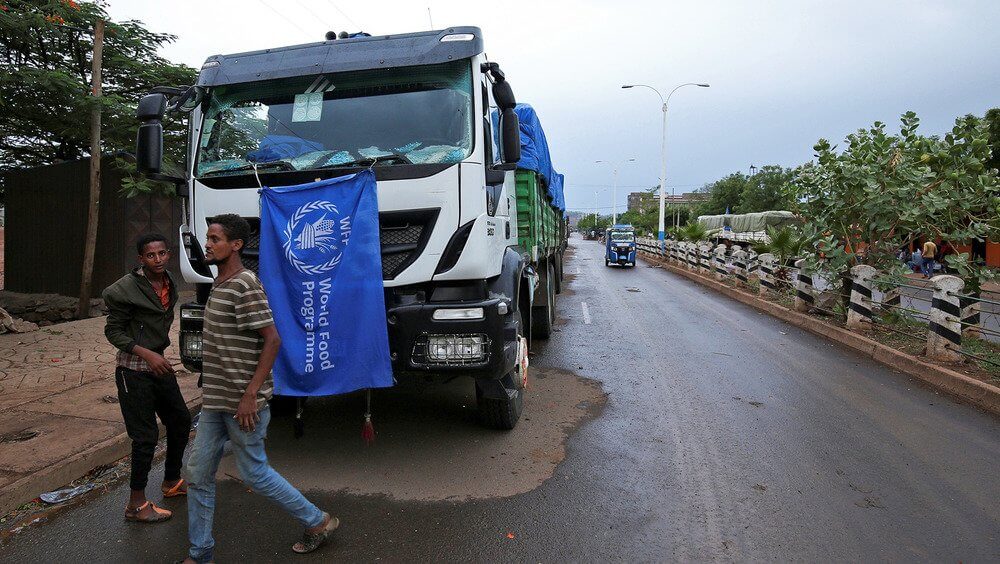The United Nations (UN) on Wednesday said that Ethiopia had arrested 72 World Food Programme (WFP) truck drivers following the detention of over 20 UN staff the previous day. Ethiopian authorities also began rounding up high-profile Tigrayans in Addis Ababa, which critics say constitutes ethnic profiling.
The drivers, who are under a UN contract, were arrested in the capital of Ethiopia’s Afar province. The arrests abruptly cut off the WFP’s operation to provide aid along the only functional road leading into Tigray.
Also Read: Ethiopian PM Abiy’s Strategy of Exaggerating Gains in the Tigray War is Doomed to Fail
Noting that officials had not given the UN any explanation for the move, a UN spokesperson said, “We are liaising with the Government of Ethiopia to understand the reasons behind their detention.” The spokesperson also added that the UN is “advocating with the government” to ensure the “safety [and] human rights” of the drivers.
The Ethiopian government led by Prime Minister Abiy Ahmed, as part of its intensifying crackdown against ethnic Tigrayans, also rounded up and arrested several high-profile individuals belonging to the country’s fourth-largest ethnic group on Wednesday. Among those arrested were Daniel Teketse, the CEO of Ethiopia’s Lion Bank, several former Tigrayan government officials, a Tigrayan member of the ruling Prosperity Party, and almost 40 Tigrayan priests.
Also Read: The Tigray Conflict Cannot Be Resolved So Long as Both Sides See Themselves Winning
While the government did not give any specific reason for the arrest of the drivers or the high profile Tigrayans, it has repeatedly accused the Tigrayan community of supporting the Tigray People’s Liberation Front (TPLF) rebels. On Tuesday, the government detained 16 local UN staff, all of them ethnic Tigrayans, in Addis Ababa for allegedly “participating in terror” and supporting terrorists, a reference to the TPLF.
Ethiopia has been targeting the Tigrayan community following the announcement last week of a nationwide state of emergency as the TPLF captured more territory and suggested that they might advance towards Addis Ababa and overthrow Abiy’s government.
The head of the state-appointed Ethiopian Human Rights Commission, Daniel Bekele, told Al Jazeera on Wednesday that there is an “ethnic element” to the detention of Tigrayans. “I do understand that the state of emergency gives powers to police to arrest people on grounds of reasonable suspicion,” he said, adding that the emergency directives are “being applied in a wrong way,” Bekele remarked.
Also Read: Ethiopia Expels UN Officials For “Meddling” in Internal Affairs, US, UN Condemn Move
However, the Ethiopian government has denied targeting Tigrayans based on their ethnicity. Ethiopian Minister of State for Foreign Affairs Redwan Hussein told Al Jazeera that “there is no systematic arrest […] because of your profile.” He noted that the declaration of emergency has made citizens more “vigilant” and has been informing the police about “unusual” activities. “If the police do not have adequate reasons to suspect, then the people would be released,” Hussein claimed.
The UN has previously criticised the Ethiopian government for preventing aid from reaching Tigray and deliberately causing famine-like conditions. The world body has also accused Abiy’s government of committing grave human rights abuses and crippling “life-saving humanitarian operations.”
Ethiopia has been in the middle of a severe humanitarian and political crisis since November last year, when PM Abiy ordered a military response to an attack on a federal army camp in Tigray by the TPLF, declared a “terrorist” organisation. The fighting quickly boiled over into a full-scale armed invasion by Ethiopian troops, who partnered with Eritrean soldiers in their operation.
The conflict in Tigray has killed thousands and displaced over two million and has witnessed grave human rights violations, including mass killings, rapes, and deliberate starvation. Both the Ethiopian government and the TPLF have accused each other of committing atrocities.

